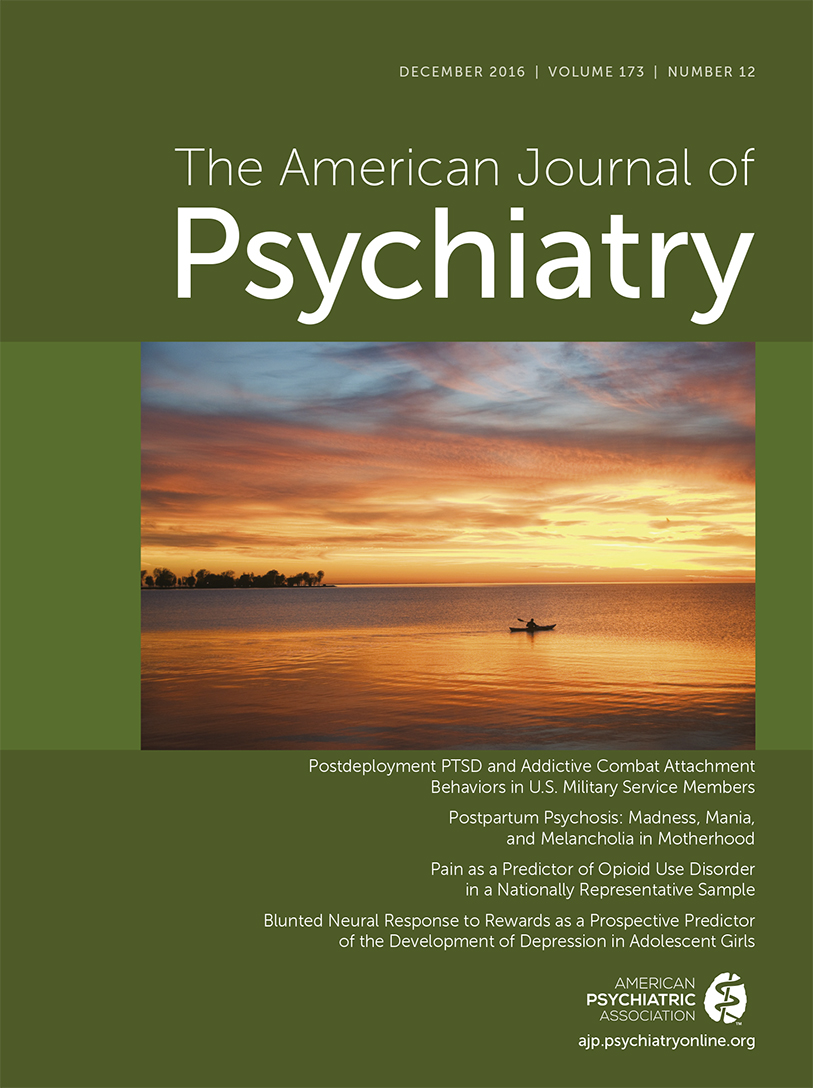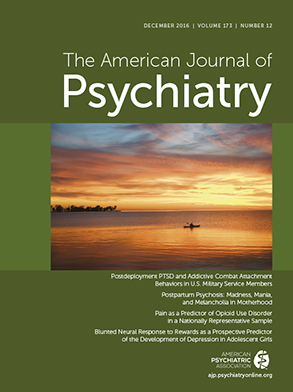Adjustment disorder has been newly moved to the trauma- and stressor-related disorders chapter of DSM-5. It is a poorly studied disorder, despite the diagnosis being frequently applied (
1). According to DSM-5, adjustment disorder symptoms “arise in response to a stressful event” (
2). DSM-5 does not provide guidance as to what constitutes a “stressful event.” If a stressful event is defined on the basis of its capacity to elicit mental health symptoms, then that is circular—or tautological, but logically flawed anyway. This nondefinition makes it very difficult to conduct a prospective longitudinal study of adjustment disorder, since anyone could be at risk at any time, and one would not know if exposure had taken place until after the outcome (symptoms or impairment) had occurred.
In this issue of the
Journal, O’Donnell et al. (
3) provide a partial solution to this epidemiological methods dilemma. They begin with a cohort of individuals exposed to a stressor that would be viewed almost universally as stressful: serious physical injury. This approach enables them to follow the cohort of exposed individuals longitudinally and determine what mental disorders—including, but not limited to, adjustment disorder—develop over the ensuing 3- and 12-month observation intervals. They also tackled the problem of there being no gold-standard diagnostic instrument for adjustment disorder by using a conglomerate of measures intended to capture its key constructs. Whereas these clever methodological innovations made it possible for the investigators to conduct the study, they also constrain interpretation of the findings to severely injured individuals and to a potentially idiosyncratic definition of adjustment disorder. These limitations notwithstanding, the study yields several important insights.
Adjustment disorders were common at 3 (19.8%) and 12 (16.3%) months. In terms of disability and quality of life, persons with an adjustment disorder reported worse outcomes than those with no diagnosis but better outcomes than those with any other DSM-5 psychiatric diagnosis examined (e.g., major depression, posttraumatic stress disorder [PTSD], generalized anxiety disorder). These findings fit with the notion that adjustment disorders are subthreshold conditions, warranting “diagnosis” because they do affect functioning and well-being, but less so than full-threshold conditions. It was also noted that having an adjustment disorder at 3 months increased the risk more than fivefold for having another mental disorder at 12 months. This observation further suggests that for many individuals, adjustment disorder is a transitional diagnosis that is subsequently eclipsed by another full-threshold mental disorder.
Implications for terminology and classification aside, these findings are instructive for clinicians who should expect the possible course of patients with adjustment disorders to include the development of another mental disorder, rather than uneventful symptom resolution. This lesson about adjustment being a “gateway disorder,” as the authors refer to it, is applicable to survivors of severe physical injury. It is unknowable from this study whether the findings generalize to individuals exposed to other less stressful events. Such research is needed.
Whereas the O’Donnell et al. study breaks new ground on an old diagnosis moved to a new chapter in DSM-5, the study by Villarreal et al. (
4), also in this issue, digs up a topic thought to be long dead: the efficacy of atypical antipsychotics for PTSD. Whereas some early, small trials had suggested that atypical antipsychotics, such as olanzapine (
5) or risperidone (
6), might be useful adjunctive (to selective serotonin reuptake inhibitors) treatment for PTSD, a large VA Cooperative Study seemed to put the nail in the coffin of that treatment option by failing to show a benefit of adjunctive risperidone on global severity of PTSD (
7). That trial, it should be noted, did show statistically significant (though, it was argued, clinically modest) beneficial effects on hyperarousal symptoms and, in a more recent secondary analysis, sleep disturbance (
8). Moreover, meta-analysis suggests that atypical antipsychotics can be useful in treating PTSD (
9), and clinicians continue to believe they are efficacious and continue to prescribe them for many (up to 20% of) patients with PTSD (
10,
11).
Against this backdrop of high antipsychotic prescribing for PTSD in the face of limited evidence of efficacy comes this new randomized placebo-controlled trial of quetiapine as monotherapy for military-related PTSD (by Villarreal et al. [
4]). Well, not really a new study, but an old study—completed in 2008—newly published. It is unclear why it took nearly a decade to publish the results of this positive study, but it is timely nonetheless. Albeit a fairly small trial that enrolled 80 patients, the results suggest that quetiapine can be useful in the treatment of PTSD, though the authors remind readers that adverse effects of this class of drugs must be considered in the risk-benefit ratio of whether to treat a given individual.
Whereas clinical practice should rarely be influenced by findings from a single trial, the results of this study should hasten a reinvigoration of research into the safety and efficacy of atypical antipsychotics for the treatment of PTSD. Though we yearn for a future where better and safer drugs for PTSD can be targeted for precisely the patients most likely to benefit from them with the fewest adverse effects, we are constrained to practice medicine in the present. Call it imprecision medicine if you must, but if atypical antipsychotics—administered as monotherapy or as adjunctive therapy—can help some patients with PTSD—then let’s shore up the evidence base for their utility so that we practitioners can feel less stressed about using them.

